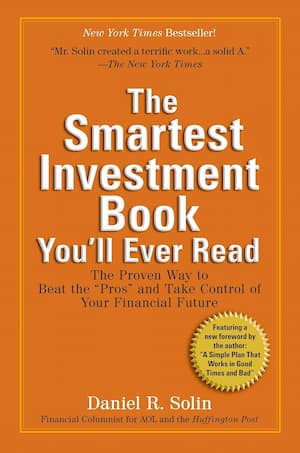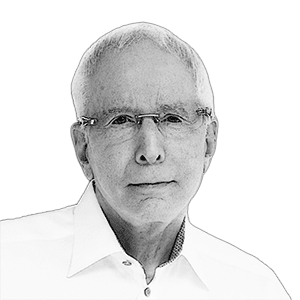A Friend in Need
Financial empowerment means that a person feels in control of their money. We found that people who feel empowered in their financial lives experience more joy, peace, satisfaction, and pride concerning their finances.
—Samantha Lamas, “What Is Financial Empowerment and Why Is It Important?,”Morningstar
Decisions about how you save, spend and invest your money can have a profound impact on your future. I understand why you are looking for guidance, insights, and strategies to navigate the complex landscape of the financial markets.
You need to know why you should trust the information and advice in the following pages.
Why Listen To Me?
I’m Dan Solin and I penned The Smartest Investment Book You’ll Ever Read in 2006. I advised buying three index funds (where the fund manager replicates the performance of a market index) from Vanguard and ignoring Wall Street “experts.”

My view then—and now—is that the goal of many of those who want to “help” you invest your money is to transfer wealth from your pocket to theirs.
That hasn’t changed.
The premise in my Smartest Investment book—that you can do just as well (and likely better) on your own—was ridiculed by many in the brokerage community who believed that active mutual fund managers could outperform their benchmark indexes through stock picking and market timing.
Smartest Investment was enthusiastically reviewed by the NY Times.
It is on Derek Sivers’ list of recommended books.
Kiplinger’s listed Smartest Investment as one of 5 classic investment books investors should read.
Style Rave listed Smartest Investment as 1 of nine “must-read financial books for every person of color.”
I went on CNBC’s Power Lunch in 2009 and said, “One of the things you could do is give us more “In Bogle we Trust’ and much less “In Cramer we Trust.”
Cramer went ballistic, which remains an enduring source of pride.
Time has proved my approach right.
As of March 20, 2020, passive funds (which include index funds, exchange-traded funds, and passively managed funds) accounted for 41 percent of combined U.S. mutual fund assets under management, a stunning increase from 14 percent in 2005.
What was considered controversial in 2006 is now mainstream.
I went on to write a series of Smartest investing books, to the great dismay of the securities industry. I’ve written thousands of blogs, appeared on many TV and radio programs, and been featured in prominent investing magazines.
My only allegiance is to you. I’m not a financial advisor. You can’t hire me.
I have one goal: To provide the research-based advice you need to achieve financial freedom.
I support the information in this book with extensive Endnotes. Please refer to the references in the Endnotes if you want more information on any subject.
Get Wealthier
Achieving wealth is more than just managing your money; it’s about controlling your life.
Being in control of your finances isn’t that hard.
If you identify as one of the roughly 97.5 million do-it-yourself (DIY) investors (primarily millennials) navigating your finances without an advisor, this book is a beacon of sound, no-nonsense wisdom.
Millennials Need Advice
The securities industry and financial media have done a great job misleading millennials and other investors.
Consequently, millennials react “strongly and inconsistently” to stock market volatility by moving to savings and deposits when the stock market declines. One survey found working millennials held 33% of their retirement savings accounts in cash.
This behavior alone has serious adverse consequences for achieving long-term financial goals.
Millennials are more inclined than other investors to be seduced by the allure of actively managed investments, which further erodes their long-term returns.
Millennials have more appetite for alternative investments, like cryptocurrency, real estate, and commodities. The evidence doesn’t support enthusiasm for these investments.
On average, millennials’ goal is to retire at age 62. That won’t happen without a dramatic shift in thinking
The information in this book can change ingrained, harmful beliefs about investing and help you reach this goal.
Why DIY?
There are many reasons why you might opt to be a DIY investor. Perhaps you can‘t afford a financial advisor, or your assets don’t meet their minimum requirements. Maybe you want to take sole responsibility for your financial life, or you don’t trust the establishment or feel they don’t understand your unique needs and goals.
More likely, millennials are rejecting the traditional role of financial advisors who often haven’t adopted the strategies and practices they prefer, like virtual meetings and paperless systems.
Even if you want to use an advisor, you may have little choice but to deal with your finances alone. Most financial advisors don’t want your business. They cater to high-net-worth investors with complex financial planning needs.
No problem. You don’t need them.
No-Fuss DIY Investing
I’m going to show you how to invest in a way that’s simple and easy.
There’s no research involved. You don’t have to pay any attention to what’s going on with the stock market.
The less you do, the better your experience will be.
The securities industry will bully you into believing you have to work constantly at investing. It wants to create fear and anxiety, so you’ll trade more and generate commissions for them. It wants to sell you complex, high-fee products because that’s what’s best for its bottom line.
It’s now easier than ever to invest intelligently and responsibly.
You can invest in only two low-fee, exchange-traded funds and have a globally diversified portfolio in an asset allocation (the division of your portfolio between stocks, bonds, and cash) suitable for your unique requirements.
By adjusting the percentage of your portfolio allocated to stocks, you can increase or decrease the risk and expected returns of this portfolio.
DIY Financial Planning: Don’t Believe the Hype
Because of the begrudging recognition that investing has been “commoditized” (meaning it’s so easy anyone can do it), the new buzzword in the investment community is the importance of “comprehensive financial planning.”
Don’t be overwhelmed by the prospect of DIY financial planning. Following some basic guidelines, you can quickly and intelligently plan for your future.
Spotting Misinformation
You’re bombarded by a tsunami of misinformation from the powerful securities industry, which seeks to undermine your efforts to achieve your retirement goals using a simple, responsible, and intelligent investment strategy.
They work closely with their partners, the financial media, which features a steady diet of “pundits” opining on everything from the market’s direction to the next hot mutual fund. They have no accountability. There’s little credible evidence their views are based on anything other than rank speculation.
If that wasn’t enough, your brain is a barrier to succeeding as a DIY investor. It’s programmed to find patterns where none exist (see Chapter –). It encourages you to procrastinate and fail to plan for your future (see Chapter –).
It’s worse if you have psychological biases that cause you to spend recklessly or to fear dealing with financial issues (see Chapter –).
These forces combine to imperil your efforts to be financially responsible and to reach your retirement goals. As a result, many give up or kick the can down the road.
I’ll show you how to identify and overcome these obstacles.
Retaining a Financial Advisor
Before you dive into this book, I want to address a common question. Should you retain a financial advisor if you meet the minimum of many (but not all) advisors?
Retaining a financial advisor is prudent if you have significant assets or complex financial, tax, or estate planning issues. You’ll need to determine if you are the right client and if they are the right advisor.
I’ll provide the information you need to select the best financial advisor for your requirements (see Chapters — —).
A Counterintuitive Message
Most DIY investors have basic investing and financial planning needs. If you fit into this category, my message is counterintuitive: Both investing and financial planning are simple and easy.
My goal isn’t to exhaustively set forth all the financial issues you’re likely to confront. In the Resources section, I list some excellent books that cover those subjects.
This book aims to make you wealthier as a successful DIY investor and financial planner by providing insights you won’t find elsewhere. The strategies are timeless, and they’ll last a lifetime.
You’ve found a friend indeed.
